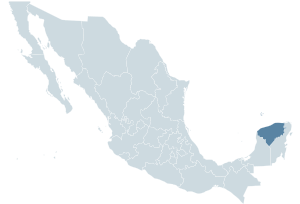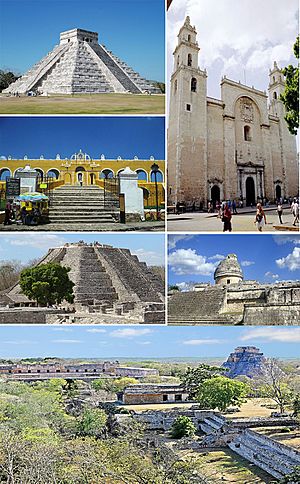Yucatán (state) facts for kids
Quick facts for kids
State of Yucatán
Estado Libre y Soberano de Yucatán
|
|||
|---|---|---|---|
|
|||

Location within Mexico
|
|||
| Country | |||
| Capital | Mérida | ||
| Municipalities | 106 | ||
| Area
Ranked 20th |
|||
| • Total | 38,402 km2 (14,827 sq mi) | ||
| Population
(2005)
|
|||
| • Total | 1,818,948 (Ranked 21st) | ||
| Time zone | UTC-6 (CST) | ||
| • Summer (DST) | UTC-5 (CDT) | ||
| HDI (2004) | 0.7778 - medium Ranked 19th |
||
| ISO 3166-2 | MX-YUC | ||
| Postal abbr. | Yuc. | ||
| Website | http://www.yucatan.gob.mx | ||
Yucatán is a state located in the eastern part of Mexico. About 1.8 million people call Yucatán home. Its capital city is Mérida, a large and historic city.
The state is found on the Yucatán Peninsula, a famous landmass that extends into the Gulf of Mexico. To its southwest, Yucatán shares a border with the state of Campeche. To the southeast, it borders Quintana Roo. The beautiful Gulf of Mexico lies along its northern coast.
Yucatán was a very important center for the ancient Mayan civilization. Even today, you can find villages where people of Mayan descent live and speak the old Mayan language. Many archaeological sites are also here, where experts study the amazing remains of the Mayan people.
Contents
Exploring the State of Yucatán
Yucatán is known for its rich history, beautiful natural areas, and unique culture. It's a place where ancient traditions meet modern life.
Geography and Climate
The Yucatán Peninsula is mostly flat. It has a limestone base, which means there are many underground rivers and cenotes. Cenotes are natural sinkholes or caves filled with clear water, perfect for swimming!
The climate in Yucatán is tropical. This means it's usually warm and humid. There are two main seasons: a rainy season and a dry season. This weather helps many different plants and animals to thrive.
History of Yucatán
Yucatán has a long and fascinating history. It was once the heartland of the powerful Mayan civilization. The Maya built impressive cities and temples, and they were advanced in math, astronomy, and writing.
After the arrival of the Spanish in the 16th century, Yucatán became part of New Spain. It later joined Mexico. For a short time in the 19th century, Yucatán was even an independent country called the Republic of Yucatán. This shows its strong local identity.
The Mayan Legacy
The Mayan influence is still very strong in Yucatán. Many people speak Yucatec Maya, alongside Spanish. Traditional Mayan foods, clothing, and customs are still a big part of daily life.
You can visit incredible Mayan ruins like Chichén Itzá and Uxmal. These sites are like giant puzzles that tell stories of an ancient world. They show how clever and skilled the Mayan people were.
Culture and Traditions
Yucatán has a unique culture that blends Mayan and Spanish influences. This mix is seen in its music, dance, food, and festivals.
Yucatecan Cuisine
The food in Yucatán is very special. It's different from other Mexican food. Dishes often use ingredients like achiote, sour oranges, and habanero peppers. Famous dishes include cochinita pibil (slow-roasted pork) and sopa de lima (lime soup).
Music and Dance
Traditional music and dance are important here. The jarana yucateca is a popular folk dance. It's lively and colorful, often performed during festivals. The music usually features guitars and trumpets.
Economy and Life
Yucatán's economy relies on several key activities. Tourism is very important, with many people visiting the Mayan ruins and beautiful beaches.
Agriculture and Industry
Farming is also a big part of the economy. Historically, henequen (a plant used to make rope) was a major crop. Today, other crops like citrus fruits and corn are grown. There is also some manufacturing and trade.
Education and Development
The state is working to improve education and living standards for its people. Mérida, the capital, is a center for learning and business. It has universities and hospitals, making it an important city in the region.
Images for kids
-
The Temple of Kukulcan at Chichén Itzá, also known as "El Castillo."
-
Agave fourcroydes, a plant important to Yucatán's history, used for making fibers.
-
A Dodge Charger police car used by the State Police in Yucatán.
See also
 In Spanish: Yucatán para niños
In Spanish: Yucatán para niños
 | Calvin Brent |
 | Walter T. Bailey |
 | Martha Cassell Thompson |
 | Alberta Jeannette Cassell |








